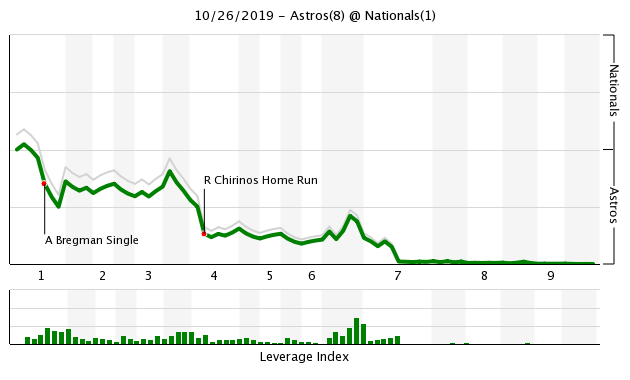Why Has the World Series Felt Boring?
Game 4 of the World Series started like gangbusters for the Houston Astros in Washington. A game-opening strikeout by Patrick Corbin against George Springer was followed with four straight singles, producing two runs to give Houston the first lead of the night. Corbin was able to leave the bases loaded in the top of the first to keep his side in the game, but when his pitcher opponent Jose Urquidy took the mound in the bottom half of the inning, he made quick work of the Nationals, inducing two foul pop-ups and stranding Anthony Rendon after his two-out single.
The rest of the game carried on, well, pretty much exactly like that. Each starter traded scoreless innings in the second and third innings, but then the Astros added on with a two-run homer by Robinson Chirinos in the fourth. Washington put up some fight by loading the bases with one out in the bottom of the sixth to bring Juan Soto up representing the tying run, but all Soto could do was bring in a single run with an otherwise harmless groundout. The Astros got their own bases-loaded opportunity the very next inning, and they didn’t miss it, with Alex Bregman crushing a grand slam to put the game out of reach. Houston got a lead early, and aside from a fleeting moment or two, never really seemed in danger of losing it, eventually tacking on enough insurance to make the Nationals’ final few at-bats little more than a formality. Here’s what the win probability chart looked like from that game:

After the fourth batter of the night, Washington’s win probability was never higher than 40%. After the sixth inning, it was never better than 15%. All told, it looked like a typical one-sided baseball game. There’s nothing wrong with that on its face, but when stacked up next to the other four games that have taken place in this World Series, there’s been a troubling trend. According to our calculations, the loser of Game 1, Houston, never had better than a 36.5% chance to win that game after the fifth inning. In Game 2, Houston’s odds of winning were below 2% entering the eighth. Washington’s highest odds of winning after the fifth inning of Game 3 were just 24.5%, and its odds of winning Game 5 after the fourth inning were never better than 13.2%. Read the rest of this entry »
